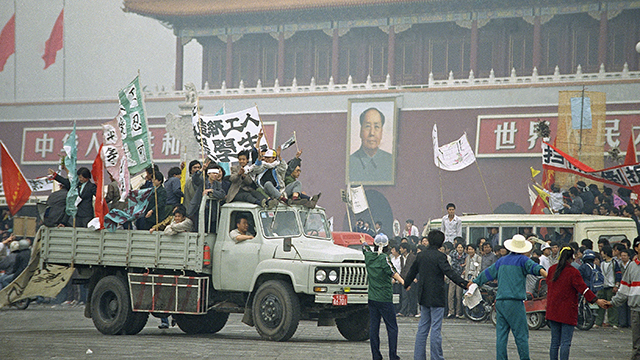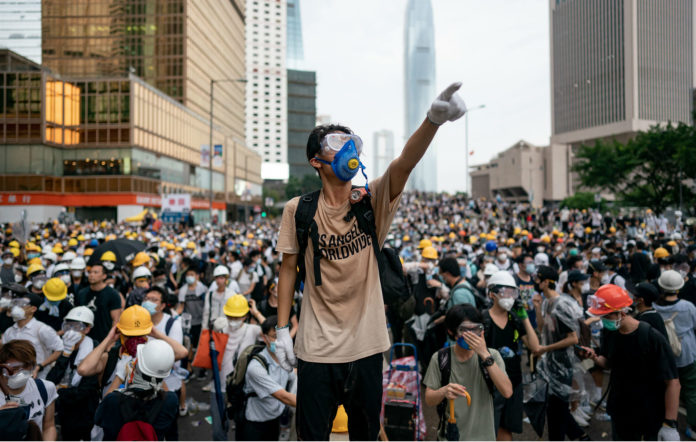
Demonstrators parade past the Gate of Heavenly Peace and the portrait of Mao Tse-Tung, to rally in Tiananmen Square of striking students, Thursday, May 18, 1989, Beijing, China. (AP Photo/Sadayuki Mikami
31 years ago the world bore witness to the ideological rupture between the Communist State in China and its citizenry that led to the iconic image of a man standing in front of a tank, a day after China’s military troops had brutally suppressed the Tiananmen Square protests, leaving thousands dead and injured, and silencing the last major movement for democracy, freedom and accountability led by Chinese citizens in China. Throughout the decades, Beijing has attempted to bury any memory associated with the Movement yet in Hong Kong, since 1990, an annual vigil has been held in commemoration of the protests and the people who died at the hands of the State. However for the first time in 30 years, the vigil will not be held this year, officially, since the authorities have banned it on grounds of curbing the spread of the coronavirus yet in the light of recent policy developments emerging from Beijing, this could very well spell the end of the occasion from this point onwards, setting a cruel premonition that the past of Tiananmen could very well be the future for Hong Kong.
Due to the global situation arising out of the COVID – 19 pandemic, it is difficult to imagine a time before masks, lockdowns, ventilators and economic downturn were the norm. However, the pandemic has been both a bane and a boon for the Communist Party of China since 2019 was a year when its internal policies came under intense global scrutiny with its gross human rights violations in East Turkistan / Xinjiang and Tibet as well as the massive student led protests in Honk Kong against the now defunct Extradition Bill. As the coronavirus was declared a global pandemic, these issues faded into the background, yet Beijing has not forgotten the pressures it faced and has sought to “rectify” the matter to prevent their reoccurrence in the future. Unfortunately, Hong Kong’s autonomy, granted under the 1997 Handover Agreement between Great Britain and China, has been deemed as a major threat to the stability and “legitimacy” of the Communist Party of China.
On 21 May, 2020 China’s rubber stamp parliament voted on and passed a draft resolution on a National Security Law for Hong Kong, in reaction to the 2019 protests as well as the Umbrella Movement in 2014 and the 2003 protests, arguing that the Hong Kong Government had been unable to curb such demonstrations. Although the details of National Security Law remain to be fleshed out, the consequences of such a resolution will have harrowing effects on the city’s remaining spaces of autonomy, a fact not lost on its citizens as protests have reemerged against Beijing. In a nutshell, the resolution could legally criminalize any act deemed to be secessionist, subversive, terrorist and /or foreign induced in nature, a very ambiguous description that effectively could apply to any and all forms of protests against Beijing’s policies. Such fears have been accentuated further as it is suggested that China could set up its own institutions in Hong Kong for security, effectively bypassing the local institutions altogether.
The legality of such a National Security Law for Hong Kong has been fiercely debated on both sides, with Beijing claiming it as part of its sovereign right to introduce laws for protection of national security while others claiming it abrogates the Basic Law and the “one country, two systems” arrangement of the 1997 Handover Agreement. The response to this legislation from the Hong Kong citizens, mainland China, advocacy groups, governments and private companies has been varied and representative of the usual quagmire that stretches from outright support or condemnation to status quo preserving statements of the need to maintain “stability”. For instance, protests have flared up in Hong Kong against the Government while Chinese media have accused the protestors of having foreign links and criticized western Governments of interfering in China’s internal matters. Recently the US and the UK Governments have put forward varied proposals in criticism of the National Security Law while a number of private companies such as HSBC and Standard Chartered have come out in support of the Law for the sake of a preserving Hong Kong’s “economic and social stability”.
The central crux of the matter remains the question over the future of the “one country, two system” arrangement that afforded Hong Kong and its citizens a certain level of autonomy in its internal matters, media and governance which is hard to find in Mainland China and almost nonexistent in its ethnic minority regions. This is not the first instance of Beijing’s attempts to curtail the autonomy of Hong Kong. In addition to last year’s protests, 2003 saw the largest mass protests in the region uptil that point since the 1989 Tiananmen Square movement against a proposed security bill that would have significantly increased the penal sentences and cover on the citizens’ actions. Similarly, the 2014 Umbrella Movement was against Beijing’s insistence that the candidates for Chief Executive needed to be vetted by the Central Government.
The annual vigil to remember the events of 1989 remains significant for the political and cultural fabric of Hong Kong, that views itself as a democratic space in contrast to its Mainland counterparts and embodied the freedom that was guaranteed to the region under the 1997 Agreement, a reality that is being chipped away at by the Communist Party of China. Beside the numerous legislations it has sought to pass in order to achieve this objective, Beijing has also attempted to reign in the economic relevance of Hong Kong as a prime site for business corporations to establish their headquarters, a quality that many argue is a fundamental reason why the State doesn’t employ the same manner of ruthless military clampdown on protests in Hong Kong, as it is seen in other parts of China. Major financial institutions such as Nomura Holdings Inc., JPMorgan, UBS and Goldman Sachs have pushed forward in recent years to form joint financial ventures in Mainland China, the significance of which lies in the fact that a number of these companies have based their businesses in Hong Kong for years and decades. Hong Kong’s Chief Executive, Carrie Lam, in tune with her previous political stances, has supported the passing of the New Security Law while the police administration has arrested hundreds in the past few days in the wake of recent protests. Although countries such as the US and UK have put forward strong statements against the imposition of such legislations, China may call their bluff since the world’s major nations are reeling, economically, from the damage caused by the pandemic. The belief is that the world needs China, more than it need Hong Kong, in these times of economic uncertainty and that despite all the protests in the past, whether it be 1989, 2003, 2014 or 2019, global business has always flocked back to the second largest economy of the world.
Hong Kong braces itself as the protestors and the Government seems to be headed towards a fresh wave of collisions on a new piece of legislation that would criminalize mockery of the Chinese national anthem as well as statements from the activists that they will go forward with the public observation of the Tiananmen Square vigil in defiance of the official order from the Government. The struggle for Hong Kong’s political and cultural identity is being fought at various levels, from the legislature to the streets to the virtual spaces of social media yet despite the perseverance of the protestors, the economic, political and bureaucratic might of the Communist Party of China seems to be slated to outlast them, just as it survived the Tiananmen Square Movement. The past of China’ ill-fated democracy movement from 1978 to 1989 seems to run the risk of mirroring the future of Hong Kong’s fragile “one country, two systems” arrangement. The next few years will be crucial in determining how much of this conjecture is realized and that would depend on the trajectory that Beijing, the Hong Kong citizens and the global world decides to place itself upon.
*Tenzing Wangdak is a visiting fellow of Tibet Policy Institute. He is a TSP Alumna and graduated from New York University. Views expressed here do not necessarily reflects those of the Tibet Policy Institute.

